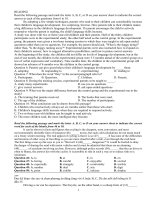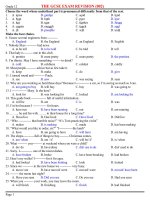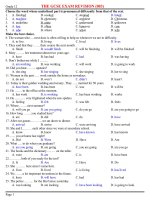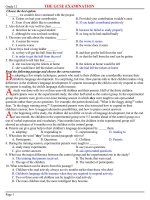GCSE 331
Bạn đang xem bản rút gọn của tài liệu. Xem và tải ngay bản đầy đủ của tài liệu tại đây (68.98 KB, 5 trang )
SƠ GD&ĐT VINH PHUC
TRƯƠNG THPT LIÊN SƠN
(Đề thi gồm: 04 trang)
ĐỀ KTCL ƠN THI THPT QUỐC GIA NĂM 20182019
Mơn: TIẾNG ANH – ĐỀ SỐ 331
Thời gian làm bài: 60 phút, không kể thời gian phát
đề
Ho va tên thi sinh:……………………………………………………………………. SBD:…………………………
Mark the letter A, B, C, or Don your answer sheet to indicate the most suitable response to
complete each of the following exchanges.
Question 01: ~ James: " How far is it from here to the post office?" ~ Tommy: "____________”
A. About two kilometers
B. It takes me 2 hours.
C. Thanks for you help
D. It's very kind of you.
Question 02: ~ Jim: “ I have a terrible headache.”
~ Ian : “ ___________”
A. Maybe I’m not going to the doctor’s.
B. Not very well. Thanks.
C. Maybe you should take a rest.
D. Not bad. I’m not going to the doctor’s.
Mark the letter A, B, C, or D on your answer sheet to indicate the word that differs from the
other three in the position of primary stress in each of the following questions.
Question 03: A. office
B. begin
C. destroy
D. complain
Question 04: A labour
B. formal
C. dangerous
D. effective
Mark the letter A, B, C, or D on your answer sheet to indicate the underlined part that needs
correction in each of the following questions.
Question 05: Reading can’t make your life longer, but reading really makes your life more thicker.
A. Reading
B. longer
C. makes
D. more thicker
Question 06: Because there are less members present tonight than there were last night, we must
wait until the next meeting to vote.
A. less
B. present
C. were
D. must
Question 07: Because of him request and his bothering me all the time, I’m finishing the project
myself.
A. him
B. project
C. bothering
D. the time
Mark the letter A, B, C, or D on your answer sheet to indicate the word(s) CLOSEST in meaning
tothe underlined word(s) in each of the following questions.
Question 08: Ask Mum for permission to go out now. She looks like she’s in a good mood.
A. fashionable
B. unconcerned
C. healthful
D. happy
th,
Question 09: The ASIAN was set up on August 8 1967 in Bangkok, Thailand.
A. established
B. begun
C. seen
D. proved
Mark the letter A, B, C, or D on your answer sheet to indicate the word(s) OPPOSITE in
meaning to the underlined word(s) in each of the following questions.
Question 10: If you are at a loose end this weekend, I will show you round the city.
A. reluctant.
B. occupied
C. free
D. confident
Question 11: The earth is being threatened and the future looks bad.
A. varied
B. defended
C. done
D. made
Mark the letter A, B, C, or D on your answer sheet to indicate the correct answer to each of the
questions.
Question 12: The________ you are, the more quickly you learn.
A. more young
B. youngest
C. younger
D. young
th
Question 13: The________ for women’s rights began in the 18 century.
A. battle
B. war
C. struggle
D. fight
Question 14: While I________ along the road, I saw an accident.
A. had cycled
B. cycled
C. have cycled
D. was cycling
Question 15: ________ he had a suggestion he didn’t raise his hand.
A. because
B. Although
C. However
D. Therefore
Question 16: Grandma broke________ in tears when we told her about dad and Mum's divorce.
A. forth
B. off
C. down
D. up
Question 17: ________ you finish typing that report, make five copies of it and give it to the officers.
A. While
B. When
C. But
D. Although
Question 18: You________ carry that carpel home yourself; the shop will send it.
A. can’t
B. couldn’t
C. needn’t
D. mustn’t
Question 19: It was the________ day of my life when I heard I failed the university entrance
examination.
A. sadden
B. saddest
C. sad
D. sadly
Question 20: Vietnam has a lot of________ players who won many gold medals in The 22nd SEA
Games.
A. outstanding
B. outstretching
C. outlying
D. outgoing
Question 21: She’s very old and can’t live alone. She needs someone to look________ her.
A. for
B. at
C. up
D. after
Question 22: Linda was shocked when I disagreed with her. She’s so used to getting her
own________.
A. views
B. mind
C. way
D. opinion
Question 23: I can't find my book anywhere; I________ it at home.
A. must leave
B. must be left
C. must have being left D. must have left
Question 24: ________ you work, ________ you will get.
A. The harder/ the best result
B. The harder/ the better result
C. The more hard/ the better result
D. The hard/ the good result
Question 25: He usually travels to________ Philadelphia by________ train.
A. Ø/ Ø
B. the/ a
C. the/ the
D. Ø/ a
Question 26: The company expanded rapidly. It grew________ all the time.
A. the bigger and bigger
B. bigger and bigger
C. more and more big
D. the bigger and the bigger
Read the following passage and mark the letter A, B, C or D on your answer sheet to indicate
the correct answer to each of the questions.
The New York Times is a daily newspaper published in New York City. For a long time, it
has been a newspaper of record in the United State and one of the world’s great newspapers. Its
strength is in its editorial excellence; it has never been the largest newspaper in terms of
circulation.
The Times was established in 1851 as a penny paper whose editors wanted to report the news in
a restrained and objective fashion. It enjoyed early success as its editors set a pattern for the
future by appealing to a cultured, intellectual readership instead of a mass audience. However, in
the late nineteenth century, it came into competition with more popular, colorful, if not lurid,
newspapers in New York City. Their publishers ran sensational stories, not because they were
true, but because they sold newspapers. Despite price increases, the time was losing £1,000 a
week when Adolph Simon Ochs bought it in 1896.
Ochs built the Times into an internationally respected daily. He hired Carr Van Anda as
editor. Van Anda placed greater stress than ever on full reporting of the news of the day, and his
reporters maintained and emphasized existing good coverage of international news. The
management of the paper decided to eliminate fiction from the paper, added a Sunday magazine
section, and reduced the paper’s price back to a penny. In April 1912, the paper took many risks to
report every aspect of the sinking of the Titanic. This greatly enhanced its prestige, and in its
coverage of two world wars, the Times continued to enhance its reputation for excellence in world
news.
In 1971, the Times was given a copy of the so-called “Pentagon Papers,” a secret
government study of U.S. involvement in the Vietnam war. When it published the report, it became
involved in several lawsuits. The U.S. Supreme Court found that the publication was protected by
the freedom-of-the-press clause in the First Amendment of the U.S Constitution. Later in the
1970s, the paper, under Adolph Ochs’s grandson, Arthur Ochs Sulzberger, introduced sweeping
changes in the organization of the newspaper and its staff and brought out a national edition
transmitted by satellite to regional printing plants.
Question 27: What is the main idea of the passage?
A. The New York Times publishes the best fiction by American writers.
B. The New York Times became highly respected throughout the world.
C. The New York Times broadcasts its news to TV stations via satellite.
D. The New York Times lost its prestige after the Vietnam War.
Question 28: It can be inferred from the passage that the circulation of the Times is
A. not the largest in the world.
B. not the best in the world.
C. the smallest in the world.
D. the worst in the world.
Question 29: Which phrase is closest in meaning to the word “restrained” in paragraph 2?
A. Put in prison.
B. In handcuffs.
C. Without education.
D. With self-control.
Question 30: According to the passage, what caused the loss of money at the Times?
A. Other newspapers were more colorful.
B. Other newspapers had better reporters.
C. Other newspapers added a Sunday magazine.
D. Other newspapers were better managed.
Question 31: What word or phrase does the word “his” in paragraph 3 refer to?
A. Van Anda. B. Reporters.
C. News of the day. D. International news.
Question 32: Which word or phrase is closest in meaning to the word “enhanced” in paragraph 3?
A. made the best of. B. increased.
C. reduced.
D. made worse.
Question 33: What word or phrase does the word “publication” in paragraph 4 refer to?
A. The Times.
B. “The pentagon Papers”. C. The Report.
D. The Constitution.
Read the following passage and mark the letter A, B, C, or D on your answer sheet to indicate
the correct answer to each of the questions.
Until the 19th century, the denial of equal rights to women met with only occasional protest
and drew little attention from most people. Because most women lacked the educational and
economic resources that would enable them to challenge the prevailing social order, women
generally accepted their inferior status as their only option. At this time, women shared these
disadvantages with the majority of working class men, as many social, economic, and political
rights were restricted to the wealthy elite. In the 19 th century, as governments in Europe and
North America began to draft new laws guaranteeing equality among men, significant numbers
of women – and some men – began to demand that women be accorded equal rights as well.
At the same time, the Industrial Revolution in Europe and North America further divided
the roles of men and women. Before the Industrial Revolution most people worked in farming or
craftsmaking, both of which took place in or near the home. Men and women usually divided the
numerous tasks among themselves and their children. Industrialization led male workers to seek
employment outside of the home in factories and other large-scale enterprises. The growing split
between home and work reinforced the idea that women’s “rightful place” was in the home, while
men belonged in the public world of employment and politics.
Organized efforts by women to achieve greater rights occurred in two major waves. The
first wave began around the mid-19th century, when women in the United States and elsewhere
campaigned to gain suffrage - that is, the right to vote. This wave lasted until the 1920s, when
several countries granted women suffrage.
Question 34: The word denial in the first sentence is the same meang to_________?
A. objective
B. refusal
C. support
D. critical
th
Question 35: Until the 19 century, what was the status of the working class men in the society?
A. They had the same rights as women.
B. They had no right at all.
C. They did not have much power compared to the wealthy people.
D. They had much power in the society.
Question 36: When did the women’s movement start in Western countries?
A. in the 18th century
B. in the late 18th century
C. in the 19th century
D. in the early 20th century
Question 37: The word guaranteeing in the first paragraph is the same meang to_________?
A. protecting
B. offering
C. enhancing
D. securing
Question 38: What was the aim of the women’s movement in the United States in the 1920s?
A. to gain the right to have much power in the society
B. to gain the right to vote
C. to gain the right to go to work in the factory
D. to have the complete equality to men
Read the following passage and m ark the letter A, B, C, or D on your answer sheet to indicate
the correct word or phrase that best fits each of the numbered blanks.
The 25th Southeast Asian Games was scheduled to be (39)________ in Vientiane, Laos, in
2009. This was the first time the country held a Southeast Asian Games. It also commemorated the
50 years of the SEA Games.
Two white elephants which symbolized Laos once "the kingdom of million elephants" were
chosen as the Official Mascots. The (40)________ of the elephants are Ms. Champee and Mr. Champa
(41)___________ the national flower of Laos. It was believed that they would bring (42)________
fortune and prosperity.
There (43)________ 25 sports in the 25th SEA Games. The number should not be more or
less in order to exactly match the 25th SEA Games.
Question 39: A. organize B organizing
C organization
D organized
Question 40: A. titles
B symbols
C names
D calls
Question 41: A sent
B represented
C. participated
D brouhgt
Question 42: A good
B bad
C. happiness
D unlucky
Question 43: A had
B happened
C were
D occurred
Mark the letter A, B, C, or D on your answer sheet to indicate the word whose underlined part
differs from the other three in pronunciation in each of the following questions.
Question 44: A. mean
B. head
C. lead
D. beat
Question 45: A. finished
B. washed
C. passed
D. attended
Mark the letter A, B, C, or D on your answer sheet to indicate the sentence that is closest in
meaning to each of the following questions.
Question 46: She has always got on well with the children.
A. She has always looked up to the children.
B. She is trying a good relationship with the children.
C. She has always been on good terms with the children.
D. She has always had personal relationship with the children.
Question 47: As he grows older, he becomes increasingly intelligent.
A. The older he grows, the more intelligent he becomes.
B. The older he grew, the more intelligent he becomes.
C. The oldest he grows, the more intelligent he becomes.
D. The older he grows, more intelligent he becomes.
Question 48: The birthday cake is too big for us to eat.
A. The birthday cake is so big for us to eat.
B. The birthday cake is so big that we can’t eat it.
C. The birthday cake is enough big for us to eat.
D. The birthday cake is too big for us that eating.
Mark the letter A, B, C, or D on your answer sheet to indicate the sentence that best combines
each pair of sentences in the following questions.
Question 49: Sue and Brian met. Shortly after that, he announced they were getting married.
A. As soon as Sue and Brian met, they announced they were getting married.
B. Until Sue and Brian met, they had announced they were getting married.
C. Right at the time Brian met Sue, he announced they were getting married.
D. Scarcely had Sue and Brian met when he announced they were getting married.
Question 50: When I heard the telephone ring, I answered it immediately.
A. On hear the phone rang, I answered it immediately.
B. On hear the phone ring, I answered it immediately.
C. On hearing the phone ring, I answered it immediately.
D. On hearing rang, I answered the phone immediately.
_________THE END__________









